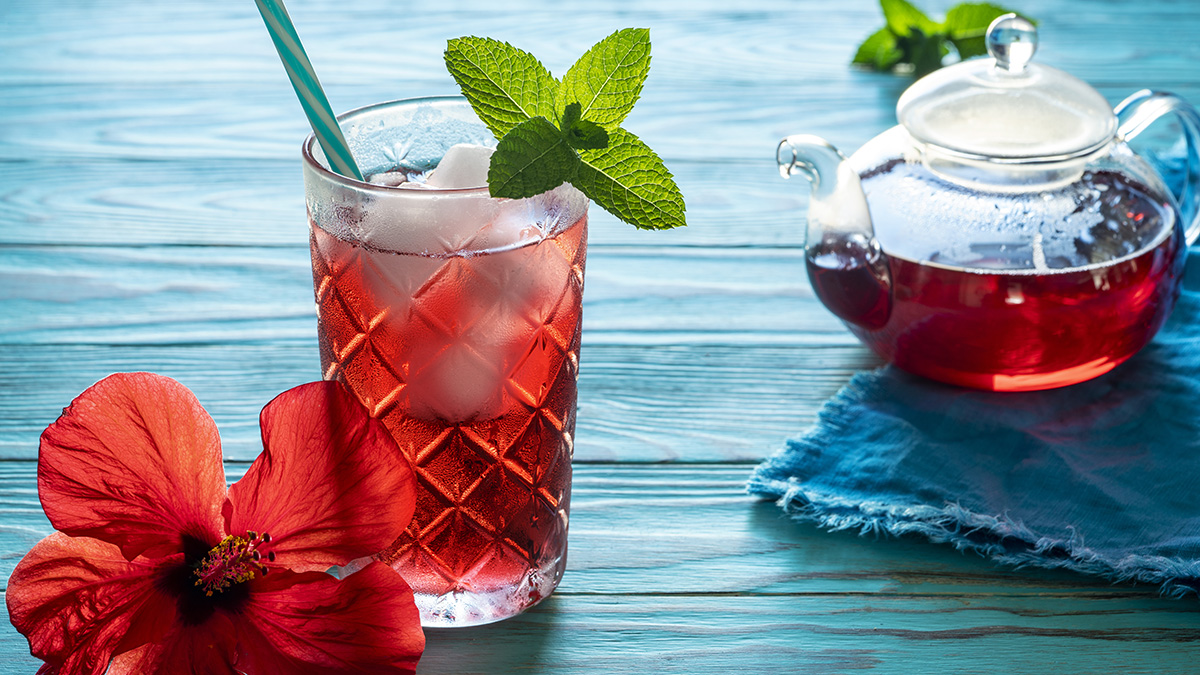What are some of the health benefits of drinking hibiscus tea before bed? Hibiscus tea, a crimson elixir derived from the vibrant petals of the Hibiscus sabdariffa plant, has gained considerable attention for its potential health benefits, particularly when consumed before bedtime. This herbal infusion not only tantalizes the taste buds with its tart and slightly sweet notes but also offers a plethora of advantages that contribute to overall well-being. Here, we delve into some health benefits that make sipping hibiscus tea before bed a potentially enriching ritual. This article will share some health benefits as well as side effects of drinking hibiscus tea before bed. Keep reading.
Health benefits of drinking hibiscus tea before bed
In the grand tapestry of wellness, hibiscus tea emerges as a versatile and potent elixir, offering a symphony of health benefits. From antioxidant prowess to cardiovascular support, hibiscus tea’s diverse advantages make it a compelling addition to one’s daily routine. As you sip this crimson infusion before bedtime, you not only partake in a sensory delight but also embark on a journey towards holistic well-being, embracing the myriad gifts that hibiscus tea graciously bestows upon both body and soul.
1. Antioxidant Powerhouse
At the forefront of hibiscus tea’s health benefits lies its potent antioxidant properties. Rich in anthocyanins, flavonoids, and polyphenols, this vibrant brew acts as a formidable scavenger, neutralizing free radicals that wreak havoc in the body. These antioxidants play a crucial role in reducing oxidative stress, fortifying the body’s defense against chronic diseases, and promoting cellular health.
2. Cardiovascular Harmony
Delving into the realm of cardiovascular health, hibiscus tea emerges as a commendable ally. Studies suggest that regular consumption may contribute to lowering blood pressure and improving lipid profiles. The tea’s vasodilatory effects help relax blood vessels, fostering improved circulation and potentially reducing the risk of heart-related ailments.
3. Dream-Inducing Brew
For those seeking a tranquil prelude to bedtime, hibiscus tea offers a soothing solution. Laden with phytochemicals that induce relaxation, it may act as a mild sedative, promoting a restful sleep experience. The absence of caffeine in hibiscus tea makes it a suitable bedtime beverage, allowing for a calm transition into the night.
4. Weight Management Wonder
In the pursuit of a healthy weight, hibiscus tea emerges as a formidable companion. Its diuretic properties may aid in shedding excess water weight, while compounds like polyphenols contribute to metabolic regulation. By supporting a balanced metabolism, hibiscus tea becomes a potentially beneficial addition to a weight management regimen.
5. Liver Love
Nurturing the body’s internal detoxification hub, hibiscus tea exhibits hepatoprotective qualities. Research suggests that it may assist in protecting the liver from oxidative stress and inflammation, promoting optimal liver function. This liver-loving attribute adds another dimension to the holistic health benefits of hibiscus tea.
6. Immune Boost
Bolstering the body’s defense mechanisms, hibiscus tea enhances immune function. The abundance of vitamin C, along with other immune-boosting compounds, fortifies the body’s resilience against infections. A robust immune system is essential for overall well-being, making hibiscus tea a valuable inclusion in one’s daily health routine.
7. Digestive Delight
Venturing into the realm of digestive health, hibiscus tea reveals its gentle yet effective nature. Its mild laxative properties and anti-inflammatory effects contribute to a harmonious digestive system. For those grappling with occasional digestive discomfort, a cup of hibiscus tea may provide relief and promote gastrointestinal well-being.
8. Radiant Skin Elixir
Beyond internal wellness, hibiscus tea extends its benefits to the skin’s outer radiance. Packed with antioxidants and vitamin C, it aids in combatting oxidative stress, promoting collagen synthesis, and maintaining skin elasticity. Regular consumption may contribute to a radiant complexion, making hibiscus tea a holistic elixir for skin health.
9. Diabetes Support
Research suggests that hibiscus tea may offer support to individuals managing diabetes. Its hypoglycemic properties may contribute to regulating blood sugar levels, making it a potentially valuable addition to a diabetic-friendly lifestyle. However, consultation with a healthcare professional is paramount for personalized guidance in managing diabetes.
10. Anti-Inflammatory Alchemy
In the intricate tapestry of potential health benefits, hibiscus tea emerges as a master weaver, deftly intertwining the thread of anti-inflammatory prowess. Within its scarlet embrace lies a symphony of compounds, notably quercetin, and anthocyanins, orchestrating a delicate dance that dampens inflammatory responses within the body. This alchemical mastery extends beyond merely managing chronic inflammatory conditions, unfurling its effects as a holistic supporter of overall health and vitality, weaving a crimson-hued sanctuary against the tempest of inflammation.
11. Hormonal Harmony
In the labyrinth of hormonal fluctuations, hibiscus tea surfaces as a gentle harmonizer, offering solace to those navigating the intricate ebbs and flows of hormonal balance. While the scientific landscape is still unfolding, preliminary studies hint at the potential of hibiscus tea to regulate hormonal oscillations, particularly in the context of women’s health. This nascent but intriguing evidence positions hibiscus tea as a noteworthy consideration for those seeking equilibrium in the intricate dance of hormones, adding a nuanced brushstroke to its canvas of potential health benefits.
12. Mood Elevation Elixir
Beyond the physiological realms, hibiscus tea extends its tendrils into the ethereal domain of mental well-being. Enigmatic compounds nestled within its ruby depths are believed to possess mood-enhancing properties, acting as a gentle breeze that sweeps in a sense of calm and relaxation. Incorporating this floral elixir into daily rituals becomes more than a mere indulgence; it transforms into a ritual of self-care, a mood-elevation elixir that, with each sip, delicately fosters emotional equilibrium, casting a rosy hue over the tapestry of one’s mental landscape.
13. Respiratory Resilience
In the expansive arena of well-being, hibiscus tea unfurls as a proponent of respiratory resilience, showcasing its potential to nurture lung health. Within its scarlet depths lies a symphony of anti-inflammatory properties, poised to extend a helping hand in alleviating respiratory afflictions such as asthma or bronchitis. It’s important to note that while hibiscus tea doesn’t replace professional medical interventions, its role as a complementary element in the maintenance of respiratory health is a testament to its versatility and potential supportive nature.
14. Cognitive Compass
Amid the intricate neural landscapes of cognitive health, hibiscus tea assumes the role of a discerning compass. Preliminary studies hint at its neuroprotective qualities, suggesting a capacity to act as a guardian in the preservation of cognitive function, potentially staving off the inexorable march of age-related cognitive decline. The cognitive compass of hibiscus tea not only steers towards potential mental acuity but adds an enigmatic layer to its already multifaceted spectrum of health benefits.
15. Antimicrobial Arsenal
In the ceaseless battle against microbial adversaries, hibiscus tea unveils its formidable antimicrobial arsenal. Scientific investigations illuminate its possession of antibacterial and antiviral properties, endowing it with an extra layer of defense against the ubiquitous threat of pathogens. This antimicrobial prowess elevates hibiscus tea beyond the realms of mere refreshment, positioning it as a guardian of health, and adding a protective dimension to its repertoire of potential contributions to overall well-being.
16. Joint Support Synergy
In the pursuit of alleviating joint discomfort, hibiscus tea emerges as a champion of joint support synergy. Within its infusion lies a harmonious blend of compounds, orchestrating a symphony that may play a pivotal role in bolstering joint health. The anti-inflammatory properties inherent in hibiscus tea, paired with its potential antioxidant effects, create a fortifying environment that aids the body’s resilience against the throes of inflammatory joint conditions. As a constituent of a comprehensive health strategy, hibiscus tea gracefully intertwines with joint health efforts, offering a botanical ally in the quest for mobility and comfort.
17. Blood Sugar Ballet
In the intricate ballet of blood sugar regulation, hibiscus tea assumes the role of a virtuoso performer, executing a dance of balance and finesse. Scientific investigations hint at its potential prowess in managing blood sugar levels, positioning it as a contemplative choice for individuals navigating the delicate terrain of glycemic control. The nuanced choreography between hibiscus tea and blood sugar levels introduces an additional layer to its multifaceted array of potential health benefits, making it a consideration in the repertoire of those mindful of metabolic harmony.
18. Hydration Harmony
Beyond the intricate web of its biochemical compounds, hibiscus tea extends its influence into the realm of hydration harmony. As a caffeine-free elixir, it assumes the role of a hydration virtuoso, offering a replenishing alternative devoid of the diuretic repercussions often associated with caffeinated counterparts. The subtle yet crucial facet of hydration harmony weaves seamlessly into hibiscus tea’s overall impact on well-being, highlighting its role not only as a flavorful infusion but also as a gentle conductor orchestrating the delicate balance of bodily fluids.

19. Visionary Vigilance
In the realm of holistic well-being, hibiscus tea directs its attention with visionary vigilance toward ocular health. Within its scarlet brew, a symphony of antioxidants, notably vitamin C and beta-carotene, orchestrates a protective dance, shielding the eyes from the ravages of time. This botanical elixir emerges as a sentinel against the shadows of age-related macular degeneration, manifesting a sightful dimension to its kaleidoscope of health benefits.
20. Anti-Aging Alchemy
In the ceaseless quest to defy the relentless march of time, hibiscus tea unfurls its enchanting anti-aging alchemy. An artful interplay of antioxidants, collagen-inducing prowess, and anti-inflammatory wizardry coalesce into a potion that reveres skin elasticity, wages war against the fine lines etched by time, and bestows upon the imbiber a visage of timeless allure. Hibiscus tea’s anti-aging alchemy beckons to those yearning for a natural, botanical embrace in their skincare regimen, offering a tantalizing prospect of vitality retained.
21. Culinary Canvas
Beyond its medicinal grace, hibiscus tea metamorphoses into a culinary canvas, painting a tapestry of flavors that transcend the boundaries of traditional libations. Its assertive, tart notes become the brushstrokes in a culinary masterpiece. From the refreshing symphony of iced teas to the avant-garde fusion of hibiscus-infused gastronomic creations, this crimson elixir transcends its role as a mere healthful brew, emerging as a versatile muse in the gastronomic realm. The culinary canvas of hibiscus tea beckons the epicurean explorer, adding a delightful dimension that extends far beyond the teacup into the realms of culinary artistry.
Side Effects of Drinking Hibiscus Tea Before Bed
Hibiscus tea, a vibrant infusion derived from the dried petals of the hibiscus flower, has gained popularity for its potential health benefits, especially when consumed before bedtime. However, like many herbal remedies, it is essential to be aware of potential side effects. Here, we delve into ten notable repercussions that may arise from indulging in this crimson elixir before settling down for the night.
1. Potential Impact on Sleep Quality
While hibiscus tea is often touted as a sleep aid due to its calming properties, paradoxically, some individuals report disruptions in their sleep patterns after consumption. This may manifest as difficulty falling asleep or frequent awakenings throughout the night. The culprit behind this phenomenon remains elusive, possibly tied to individual variations in response.
2. Gastrointestinal Distress
One of the more common side effects associated with hibiscus tea, especially when imbibed in excess, is gastrointestinal discomfort. This can encompass a spectrum of symptoms, ranging from mild bloating to more pronounced abdominal cramps and, in some instances, diarrhea. The tea’s acidity and its potential laxative effect may contribute to these digestive disturbances.
3. Interactions with Medications
For individuals on certain medications, particularly those for hypertension, the consumption of hibiscus tea may pose a risk. The tea has been observed to lower blood pressure, and combining it with antihypertensive drugs could result in an excessive drop, leading to dizziness or fainting. Consulting a healthcare professional before incorporating hibiscus tea into one’s routine is crucial, especially for those on medication regimens.
4. Possible Allergic Reactions
While relatively rare, allergic reactions to hibiscus tea have been documented. Individuals sensitive to plants within the Malvaceae family, which includes hibiscus, may experience symptoms such as itching, hives, or swelling. Individuals with known allergies must exercise caution and monitor for any adverse reactions upon consumption. Tea, Coffee, Energy Drinks, Juice, Beverage, Smoothie, and more
5. Impact on Blood Sugar Levels
For individuals with diabetes or those managing their blood sugar levels, hibiscus tea may have implications. Some studies suggest that the tea could potentially lower blood sugar levels, which may necessitate adjustments in diabetes management plans. Regular monitoring of blood sugar levels is advisable for those who regularly enjoy hibiscus tea.
6. Potential for Hypertensive Crisis
While hibiscus tea is generally praised for its ability to reduce blood pressure, there exists a paradoxical concern for individuals with extremely low blood pressure. Consuming hibiscus tea in such cases may lead to a hypertensive crisis, characterized by symptoms like severe headaches and nosebleeds. Monitoring blood pressure regularly becomes imperative to avoid complications.
7. Dental Concerns
The acidity of hibiscus tea can pose challenges for dental health. Frequent consumption, especially without proper oral care, may contribute to enamel erosion and increased tooth sensitivity. Rinsing the mouth or consuming the tea with a straw can mitigate this risk, preserving both the allure of a healthy smile and the potential benefits of hibiscus tea.
8. Potential Impact on Pregnancy
Pregnant individuals are often advised to exercise caution with herbal teas, and hibiscus is no exception. Some studies suggest a potential link between hibiscus consumption and adverse pregnancy outcomes, including an increased risk of miscarriage. Given the uncertainties, consulting with a healthcare provider before including hibiscus tea in the diet during pregnancy is prudent. Best Year Ever PLR Package Review, Bonus, OTO, Earning
9. Electrolyte Imbalance
In some instances, excessive consumption of hibiscus tea may contribute to electrolyte imbalances, particularly in individuals with pre-existing conditions or those susceptible to electrolyte disturbances. This could manifest as symptoms like muscle weakness or irregular heartbeats. Moderation in consumption is key to mitigating this risk.
10. Potential Antioxidant Overload
While antioxidants are generally celebrated for their health-promoting properties, an excess of anything, even antioxidants, may have repercussions. Hibiscus tea is rich in antioxidants, and excessive consumption may lead to an imbalance in the body’s antioxidant status. Striking a balance in tea intake ensures reaping the benefits without overwhelming the body’s delicate equilibrium.
In conclusion, while hibiscus tea can undoubtedly be a delightful addition to one’s beverage repertoire, awareness of its potential side effects is paramount. Individual responses vary, and moderation, coupled with an understanding of personal health conditions, is the key to savoring the benefits of this vibrant herbal infusion without succumbing to its potential pitfalls.
More Interesting Articles
- Secrets Why Japanese Green Tea is Good for Health
- How Drinking Green Tea Can Help Lower Cholesterol
- What is the Best Water to Make Tea or Coffee at Home?
- Health Benefits of Drinking Black Coffee vs Green Tea
- Green Tea for Acne Treatment: Benefits, Uses, Forms
- 9 Great Health Benefits of Matcha Green Tea Powder
- 5 Tips on How to Make Iced Tea with Tea Bags Instantly
- 33 Health Benefits of Drinking Green Tea in the Morning
- 20 Great Health Benefits of Lemongrass and Ginger Tea
- Matcha Green Tea Powder All Natural Weight Loss Metabolism Booster And Diet
- 15 Hibiscus Tea Proven Benefits with Some Side Effects
- 12 Benefits of Chamomile Tea in Weight Loss & More
- 17 Incredible Blue Butterfly Pea Flower Tea Health Benefits
- Teavana Peach Citrus White Tea Facts To Know Well
- 23 Healthy Benefits of Drinking Chamomile Tea Daily
- 9 Healthy Benefits of Drinking Green Tea for Skin & Hair
- 5 Tips On How to Start Exercising When You’re Out of Shape
- 10 Home Remedies for Cold and Flu with Headache
- 11 Proven Health Benefits of Japanese Sencha Green Tea
- 15 Drinking Too Much Tea Side Effects Backed By Science



